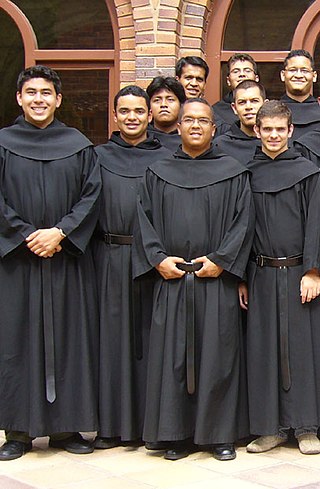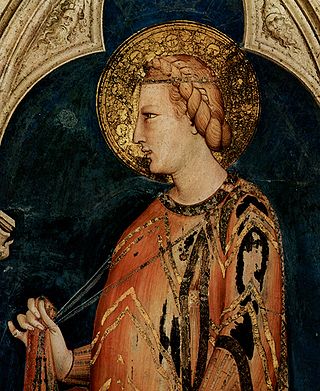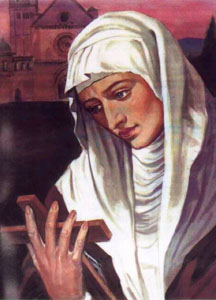Related Research Articles

The Franciscans are a group of related mendicant religious orders of the Catholic Church. Founded in 1209 by the Italian saint Francis of Assisi, these orders include three independent orders for men, orders for nuns such as the Order of Saint Clare, and the Third Order of Saint Francis open to male and female members. They adhere to the teachings and spiritual disciplines of the founder and of his main associates and followers, such as Clare of Assisi, Anthony of Padua, and Elizabeth of Hungary. Several smaller Protestant Franciscan orders or other groups have been established since late 1800s as well, particularly in the Anglican and Lutheran traditions.

Thomas of Celano was an Italian friar of the Franciscans as well as a poet and the author of three hagiographies about Francis of Assisi.

A friar is a member of one of the mendicant orders in the Roman Catholic Church. There are also friars outside of the Roman Catholic Church, such as within the Anglican Communion. The term, first used in the 12th or 13th century, distinguishes the mendicants' itinerant apostolic character, exercised broadly under the jurisdiction of a superior general, from the older monastic orders' allegiance to a single monastery formalized by their vow of stability. A friar may be in holy orders or be a non-ordained brother. The most significant orders of friars are the Dominicans, Franciscans, Augustinians, and Carmelites.

Elizabeth of Hungary, also known as Elisabeth of Thuringia, was a princess of the Kingdom of Hungary and the landgravine of Thuringia.

Giles of Assisi, was one of the original companions of Francis of Assisi and holds a leading place among them. St. Francis called him "The Knight of our Round Table".

Agnellus of Pisa, OFM, was an Italian Franciscan friar. As the order's first minister provincial in England (1224–1236), he is considered the founder of the Franciscans in England. His feast day is variously observed in the Catholic Church, on 7 May or 10 September.

Agnes of Assisi was one of the first abbesses of the Order of Poor Ladies. She also planted additional communities of the order. She was a younger sister of Clare of Assisi, who is credited with founding the order. Pope Benedict XIV canonized Agnes as a saint in 1753.

Brother Leo was the favorite disciple, secretary and confessor of Francis of Assisi. The dates of his birth and of his becoming a Franciscan are not known; a native of Assisi, he was one of the small group of most trusted companions of the saint during his last years.
Pacificus was a disciple of St. Francis of Assisi, born probably near Ascoli, Italy, in the second half of the twelfth century; died, it is thought, at Lens, France, around 1234.

Berard of Carbio was a thirteenth-century Franciscan friar who was executed in Morocco for attempting to promote Christianity. He and his companions, Peter, Otho, Accursius, and Adjutus, are venerated as Catholic saints and considered the Franciscan Protomartyrs. Expelled from the kingdom twice, they returned each time and continued to preach against Islam. In anger and frustration, the king finally beheaded them.

Juniper, also known as Brother Juniper, called "the renowned jester of the Lord", was one of the original followers of Francis of Assisi. Not much is known about Juniper before he joined the friars. In 1210, he was received into the Order of Friars Minor by Francis himself. "Would to God, my brothers, that I had a whole forest of such Junipers," Francis would delightfully pun.

Daniel and companions were seven Friars Minor martyred at Ceuta on 10 October 1227, according to the Chronicle of the Twenty-Four Generals of the Order of Friars Minor. The names of Daniel's companions are borrowed from the authentic account of the martyrdom of Berard of Carbio and his companions in 1220.

Bernard of Quintavalle was the first disciple of St. Francis of Assisi. Bernard was declared as the Minorum Ordinis prima plantula, the "First fruits of the Minor Orders". He accompanied Francis on a number of missionary journeys and served as Minister Provincial in Spain.
Bernard of Besse was a French Friar Minor and chronicler.

The Secular Franciscan Order is the third branch of the Franciscan Family formed by Catholic men and women who seek to observe the Gospel of Jesus by following the example of Francis of Assisi. Secular Franciscans are not like the other third orders, since they are not under the higher direction of the same institute. Brothers and sisters of the Secular Franciscan Order make a spiritual commitment (promises) to their own Rule, and Secular Franciscan fraternities can not exist without the assistance of the first or second Franciscan Orders. The Secular Franciscan Order was the third of the three families founded by Francis of Assisi 800 years ago.

Giovanni Parenti, O.F.M. was an Italian Friar Minor and St. Francis of Assisi's successor as head of the order. Parenti had a legal background. He served as Minister Provincial in Spain before being chosen Minister General in 1227. Parenti held a literal interpretation of poverty as it applied to the order; a view that was not shared by everyone. He stepped down in 1232 and was succeeded by Elias of Cortona.

Albert of Pisa, O.Min., was an Italian Franciscan friar. He served as minister provincial for Germany, Hungary, and England. In 1239, he was elected Minister General of the Order.

Emerging since the 19th century, there are several Protestant adherent and groups, sometimes organised as religious orders, which strive to adhere to the teachings and spiritual disciplines of Saint Francis of Assisi.
The Chronicle of the Twenty-Four Generals of the Order of Friars Minor is a medieval chronicle written in Latin around 1370, possibly by the Franciscan friar Arnaud de Sarrant, though Ralf Lützelschwab doubts this attribution. The work deals with the history of Franciscan Order from its foundation by Saint Francis of Assisi to Leonardo Rossi (1373–1378), the 24th Minister General if counting Francis as the first. The chronicle contains detailed accounts of various miracles and martyrs. For example, the Chronicle describes the deaths of Berard and his companions, the first Franciscan martyrs, killed in Morocco in 1221. Overall, the Chronicle was heavily used by later Franciscan historians.

The Order of Friars Minor is a mendicant Catholic religious order, founded in 1209 by Francis of Assisi. The order adheres to the teachings and spiritual disciplines of the founder and of his main associates and followers, such as Clare of Assisi, Anthony of Padua, and Elizabeth of Hungary, among many others. The Order of Friars Minor is the largest of the contemporary First Orders within the Franciscan movement.
References
- 1 2 Noel Muscat, ed. Chronicle of the Twenty-Four Generals of the Order of Friars Minor [1369-1374], Section 1: Saint Francis and His Companions (TAU Franciscan Communications, 2010), pp. 7–8.
- 1 2 English translation of the Kinship in Regis J. Armstrong, J. A. Wayne Hellmann and William J. Short, eds., Francis of Assisi: Early Documents, Vol. 3: The Prophet (New City Press, 1999), pp. 671–733.